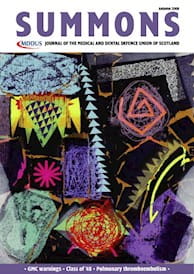SOME YEARS AGO I had a heated argument with a member of the philosophy department in my university about whether ethics was or was not ‘for’ something. For him Ethics (with an upper case 'E') was an interesting field for academic study. For me ethics (with a lower case 'e') must be translatable into moral action: i.e. it has to work in real life!
Ethics, or moral philosophy, attempts to address such age-old questions as 'How do we know what is good?' 'How should I live?' 'How can we know which decision is right?' and 'What is justice?' in order to establish a basis for moral judgements. I find it helpful to compare the relationship between ethics and morals to that between DNA and cell proteins. Within the DNA (c.f. ethics) lies the fundamental information for the cell to function. The proteins (c.f. morals) produced by the cell interpret and follow that information by doing two things — they express both the nature and character of the cell and also perform its specific function.
In the same way that cells must work together within and among bodily structures and organs, ethics and morals are about individuals living and working in community – it is not just about 'me' and 'mine'. Thus each one of us is required to think ethically and act morally (i.e. we are all 'moral agents') in every aspect of our lives. This is not an optional extra!
Clinical practice, ethical analysis and moral action cannot be practised in isolation from one another. Ethics is a necessary part of good clinical medicine and dentistry. Indeed, you have been making ethical decisions every day since you qualified often without recognising it! How then do we go about making sound ethical judgements in the clinical context? Whatever method is used it must recognise the often complex realities of the clinical setting, identify the ethical conflicts, be consistent and free of contradiction within and among cases, and produce answers that are both comprehensive and clinically relevant.
There is no 'magic' formula (beware those who suggest that there is) and each case is different from any other. Indeed, there is seldom an absolutely 'right' or 'wrong' decision. One is often trying to balance the greater good or the lesser evil. This does not mean that ethical decision-making is necessarily arbitrary (though it may be if the basis for decision making is flawed). Although some decisions must be reached quickly, the decision-making process should be no less rigorous. This involves defining and analysing the problems and their context, considering the underlying principles involved, then moving to recommending actions that best meet the whole clinical picture.
Some of the ethical issues we face can be dealt with relatively straightforwardly. Others are highly complex and may be intractable. Ready-made answers cannot be found in textbooks, because the situations in which problems arise and the stories of people involved are all different. The desired goals may also differ. For example, the prevention of disease and health promotion raise different issues and require alternative solutions to the relief of symptoms, pain and suffering or the cure of a disease. The establishment of clinical ethics committees by some NHS trusts has helped to deal with particularly difficult problems (e.g. end-oflife decisions) and develop guidelines for good practice in dealing with them.
In my opinion undoubtedly the best context in which to resolve ethical issues is in a clinical consultation involving an experienced clinician well versed in ethical principles. From my experience of clinical practice and teaching students and doctors over four decades we cannot rely solely on 'common sense' to achieve the objectives outlined above. That is why it is vital that learning about ethics should be at the heart of medical and dental education and lifelong learning for doctors, dentists and, indeed, all healthcare professionals.
Professor Gordon M Stirrat, Emeritus Professor of Obstetrics and Gynaecology and Senior Research Fellow in Ethics in Medicine, University of Bristol
This page was correct at the time of publication. Any guidance is intended as general guidance for members only. If you are a member and need specific advice relating to your own circumstances, please contact one of our advisers.
Read more from this issue of Insight

Save this article
Save this article to a list of favourite articles which members can access in their account.
Save to library